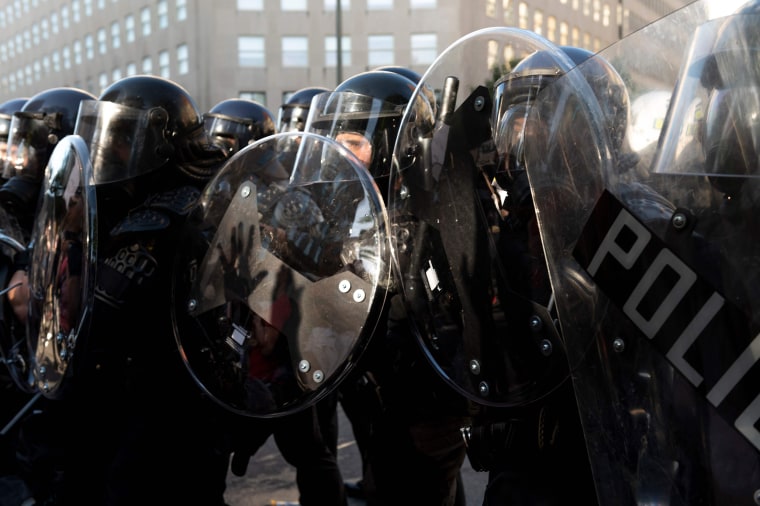Sens. Chris Murphy (D-Conn.) and Chuck Schumer (D-N.Y.) wrote to Donald Trump yesterday, making a compelling case against the use of unidentified law enforcement. The letter read in part:
"No law enforcement officer should be anonymous when engaging with the public in this manner. Not only does it make it impossible to hold personnel accountable for their actions, it also poses serious public safety concerns when members of the public are unable to differentiate a legitimate law enforcement officer from someone just dressed up like one.... No administration, regardless of political party, should have the authority to deploy unidentifiable law enforcement who cannot be held accountable to the American people."
The Democratic senators alerted the president to the fact that they're pursuing a legislative remedy to the problem, but in the interim, Schumer and Murphy would like to see the White House "proactively require all federal officers and Armed Services members who are engaged in domestic security duties like policing protests to clearly identify who they are and who they work for."
Under normal circumstances, such a request would seem wholly unnecessary. As we discussed last week, Americans have grown accustomed to seeing law-enforcement personnel in uniforms for many years, and in each instance, they're easily identifiable: we know whom those in uniform work for; we can see their name; and in many instances, we can reference a badge number.
The point, of course, is to add a layer of accountability to law enforcement. It also lets the public know who does and does not have legal authority: when law-enforcement personnel are identifiable, we know they're not part of a private security force; they're not militia members playing make-believe; and they're not security guards. These practices simultaneously let other law-enforcement officials know who they are to one another.
And yet, as a Washington Post report noted last week, residents of the nation's capital have been confronted this week "with a number of other heavily armed law enforcement officers who share an unexpected characteristic: Neither their affiliation nor their personal identities are discernible."
Several D.C.-area journalists have highlighted the problem, including my MSNBC colleague Garrett Haake, who published a tweet from outside the White House, where he saw federal law enforcement "of some kind," with personnel who wouldn't identify themselves, and whose "insignias and name plates have been removed."
The Post's analysis went on to note, "Such anonymity echoes the way in which enforcers in autocratic regimes have worked to avoid accountability. If you believe that you were unlawfully detained or assaulted by a law enforcement official, you can try to hold them to account.... But how do you hold someone accountable when you don't know who they are or even who they work for?"
With this in mind, Murphy and Schumer have unveiled new legislation (S. 3909) that would require federal law enforcement officers "to visibly display identifying information" while engaged in crowd control and/or when detaining individuals engaged in civil disobedience or demonstrations.
My naive hope was that such a measure could garner bipartisan support. After all, there's nothing especially ideological about this. As of this morning, however, the bill has 20 co-sponsors -- zero of whom are Republicans.
That said, it's early -- it was only yesterday that the legislation was assigned a bill number -- and it's still possible the measure will generate at least some GOP support.
Alternatively, we can wait until a Democratic administration deploys secret military police onto public streets, at which point, Republican lawmakers will quickly embrace the idea that unidentified law enforcement is antithetical to American values.
* Postscript: The Senate proposal doesn't yet have a companion bill in the House, though Speaker Nancy Pelosi (D-Calif.) wrote to Trump about the issue late last week.
"The practice of officers operating with full anonymity undermines accountability, ignites government distrust and suspicion, and is counter to the principle of procedural justice and legitimacy during this precarious moment in our nation's history," Pelosi wrote.

